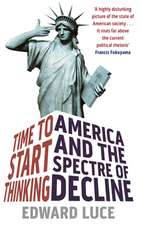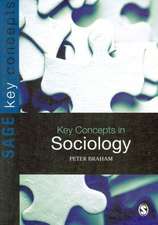The daily power game: International Series on the Quality of Working Life, cartea 6
Autor M. Mulderen Limba Engleză Paperback – 8 mar 2012
Preț: 376.96 lei
Nou
Puncte Express: 565
Preț estimativ în valută:
72.14€ • 73.88$ • 60.01£
72.14€ • 73.88$ • 60.01£
Carte tipărită la comandă
Livrare economică 18 martie-01 aprilie
Preluare comenzi: 021 569.72.76
Specificații
ISBN-13: 9781468469530
ISBN-10: 1468469533
Pagini: 108
Ilustrații: 106 p.
Dimensiuni: 152 x 229 x 6 mm
Greutate: 0.15 kg
Ediția:Softcover reprint of the original 1st ed. 1977
Editura: Springer Us
Colecția Springer
Seria International Series on the Quality of Working Life
Locul publicării:New York, NY, United States
ISBN-10: 1468469533
Pagini: 108
Ilustrații: 106 p.
Dimensiuni: 152 x 229 x 6 mm
Greutate: 0.15 kg
Ediția:Softcover reprint of the original 1st ed. 1977
Editura: Springer Us
Colecția Springer
Seria International Series on the Quality of Working Life
Locul publicării:New York, NY, United States
Public țintă
ResearchCuprins
1. The Theory of Inequality in Power and Struggle for Power.- The striving for power.- The struggle for power in keeping less powerful persons at a distance.- The struggle for power in reducing the distance to the more powerful person.- Reality, irreality and the costs of power.- Unintentional effects of participation.- Illegitimate power is identical to legitimate power.- Personality theory.- Effects of an imaginary short power distance.- Mutually reinforcing power mechanisms.- Equalization tendancies outside power relationships.- 2. Applied Research Methods.- The objectivity of researcher and method.- Simulated microsystems of inequality in power.- Field research on inequality in power.- 3. Research Results.- Satisfaction given by power.- Increase in power distance to the less powerful.- Reduction in power distance at a low level of reality.- Reduction in power distance at a high level of reality.- Power distance reduction theory as a theory of addiction.- The costs of power.- Participation; hopes and fears.- A preference for illegitimate power.- Personality theory and power distance.- Power distance reduction based on a mere image.- Counter-power of the less powerful.- Equalization tendencies: what is the model’s message?.- 4. The Beginning and the End of the Addiction to Power.- Economically rational interpretation of power.- The power distance reduction theory and the struggle for power.- The addiction to power distance reduction.- The costs of the exercise of power.- Unsuccessful learning processes in participation procedure.- The quality of power.- Personality theory and power distance reduction.- Cognitive power distance theory; primitive power structures.- Equalization tendencies outside power relationships..- Future expectations; what do we want to learn.-Peace and happiness for each of the two power classes?.- Multiphase theory of social systems.- The counter-power of the powerless.- The power distance reduction theory as a learning strategy.- Basic Concepts.- The Sequence of Hypotheses in Power Distance Theory.













